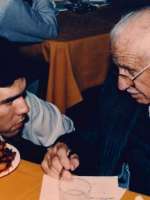Donald Duck

If you like this character, let us know!
Donald Duck is a cartoon character created in 1934, at Walt Disney Productions. Donald is an anthropomorphic white duck with a yellow-orange bill, legs, and feet. He typically wears a sailor shirt and cap with a black or red bow tie. Donald is most famous for his semi-intelligible speech and his mischievous and temperamental personality. Along with his friend Mickey Mouse, Donald is one of the most popular Disney characters and was included in TV Guide's list of the 50 greatest cartoon characters of all time in 2002. He has appeared in more films than any other Disney character, and is the most published comic book character in the world outside of the superhero genre.Donald Duck rose to fame with his comedic roles in animated cartoons. Donald's first appearance was in 1934 in The Wise Little Hen, but it was his second appearance in Orphan's Benefit which introduced him as a temperamental comic foil to Mickey Mouse. Throughout the next two decades Donald appeared in over 150 theatrical films, several of which were recognized at the Academy Awards. In the 1930s, he typically appeared as part of a comic trio with Mickey and Goofy, and was given his own film series in 1937 starting with Don Donald. These films introduced Donald's love interest Daisy Duck and often included his three nephews Huey, Dewey, and Louie. After the 1956 film Chips Ahoy, Donald appeared primarily in educational films before eventually returning to theatrical animation in Mickey's Christmas Carol (1983). His most recent appearance in a theatrical film was 1999's Fantasia 2000. Donald has also appeared in direct-to-video features such as Mickey, Donald, Goofy: The Three Musketeers (2004), television series such as Mickey Mouse Clubhouse (2006–2013), and video games such as QuackShot (1991).
Beyond animation Donald is primarily known for his appearances in comics. Donald was most famously drawn by Al Taliaferro, Carl Barks, and Don Rosa. Barks in particular is credited for greatly expanding the "Donald Duck universe", the world in which Donald lives, and creating many additional characters such as Donald's rich uncle Scrooge McDuck. Donald has been a very popular character in Europe, particularly in Nordic countries where his weekly magazine Donald Duck & Co was the most popular comics publication from the 1950s to 2009. Disney comics' fandom is sometimes referred to as "Donaldism", a term which originated in Norway (Norwegian: Donaldisme).
Best films
Played by the actors
Filmography of Donald Duck (44 films)
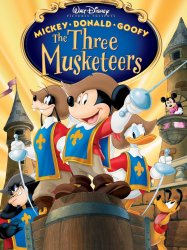 , 1h4
, 1h4Origin USA
Genres Comedy, Adventure, Musical, Animation
Themes Films about animals, Films about dogs, Films about birds, Mise en scène d'un rongeur, Mise en scène d'une souris, Children's films, Mise en scène d'un mammifère
Actors Wayne Allwine, Tony Anselmo, Bill Farmer, Russi Taylor, Tress MacNeille, Jim Cummings
Rating64%





Mickey Mouse, Donald Duck, Goofy, and Mickey's dog Pluto are street urchins, who, while being robbed by masked bandits (played by the Beagle Boys) are saved by the Royal Musketeers, Athos, Aramis, Porthos and D'Artagnan. Mickey is gifted one of their hats, inspiring him to follow their example and become a musketeer; however, in the present day, he, Donald and Goofy are janitors for the musketeers' base.
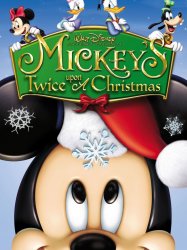 , 1h8
, 1h8Directed by Matthew O'Callaghan
Origin USA
Genres Animation
Themes Films about animals, Christmas films, Films about dogs, Films about birds, Mise en scène d'un rongeur, Mise en scène d'une souris, Children's films, Mise en scène d'un mammifère, Santa Claus in film
Actors Wayne Allwine, Tony Anselmo, Bill Farmer, Russi Taylor, Tress MacNeille, Kellie Martin
Rating65%





The narrator recites the first 10 words of The Night Before Christmas before saying, "Oh, wait. Different story, but we'll still see a mouse". The narrator announces new tales of giving and loving, and a book opens to show pop-up elves.
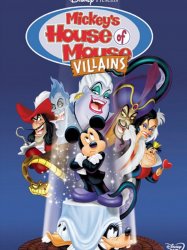
Mickey's House of Villains (2001)
, 1h8Directed by Burton Gillett, Jack King
Origin USA
Genres Comedy, Animation
Themes Films about animals, Films about dogs, Films about birds, Mise en scène d'un rongeur, Mise en scène d'une souris, Children's films, Mise en scène d'un mammifère
Actors Wayne Allwine, Russi Taylor, Jeff Bennett, Tony Anselmo, Bill Farmer, Susanne Blakeslee
Rating66%





It is Halloween night at the House of Mouse, and a lot of villains are showing up. Jafar has a trick in store for the usual heroes of the House, but the villains have to wait until midnight for him to unleash it.
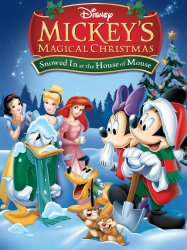 , 1h5
, 1h5Directed by Burny Mattinson, Roberts Gannaway
Origin USA
Genres Comedy, Animation
Themes Films about animals, Christmas films, Films about birds, Mise en scène d'un rongeur, Mise en scène d'une souris, Children's films, Mise en scène d'un mammifère
Actors Wayne Allwine, Tony Anselmo, Carlos Alazraqui, Bill Farmer, Jeff Bennett, Russi Taylor
Rating67%





A snowstorm leaves everyone in the House of Mouse stranded and "bah-humbug" Donald doesn't have any Christmas spirit. Mickey and all the other guests get hot chocolate and cookies to make Donald feel his Christmas spirit. The fun starts when Minnie gets the Christmas cartoons to watch. Their magical memories see to it that everyone has a holiday spirit, even Donald. At the end, everyone gets together and sings a musical number, "The Best Christmas of All".
 , 1h10
, 1h10Directed by Jean-François Laguionie, Jun Falkenstein, Toby Shelton
Origin USA
Genres Comedy, Animation
Themes Films about animals, Christmas films, Films about dogs, Films about birds, Mise en scène d'un rongeur, Mise en scène d'une souris, Children's films, Mise en scène d'un mammifère, Santa Claus in film
Actors Wayne Allwine, Kelsey Grammer, Tony Anselmo, Tress MacNeille, Russi Taylor, Milton Berle
Rating70%





Huey, Dewey and Louie wake up one Christmas morning and open their presents, even though they are supposed to wait first for Aunt Daisy, Uncle Scrooge and Aunt Gertie to arrive. After the boys take their new sleds from their Uncle Donald (not reading the included gift card) they go sledding and have Christmas dinner. While Donald, Daisy, Uncle Scrooge and Aunt Gertie sing carols, the boys play with their new toys. Later, it is time for the boys to go to bed and having enjoyed the day immensely, the boys then wish that it would be Christmas every day. Their wish is granted and at first the three are joyful. After a few days, however, they begin to get sick of Christmas and soon realize that every day will be exactly the same as the day when they first made their wish. They then decide to change the course of action of the next day by playing tricks and pranks, including swapping the cooked turkey with a live one for the dinner table. The day turns out to be a bad Christmas for everyone, especially Donald. After this, the boys finally read the gift card that was given to them which they had previously disregarded. The card is from Donald and Daisy, it wishes them love and explains that Christmas is not just about presents, it is about being with family. The boys instantly become guilty for their pranks and decide to make amends by making the next day the best Christmas ever. At the end of the next day, the boys finally realize the true meaning of Christmas and the time loop comes to an end, leading into the day after Christmas.
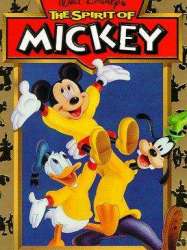
The Spirit of Mickey (1998)
, 1h23Origin USA
Genres Animation
Themes Films about animals, Children's films
Actors Wayne Allwine, Tony Anselmo, Walt Disney, Corey Burton, Jeannie Elias, Bill Farmer
Rating75%





Anthologie des cartoons de Mickey Mouse et ses amis
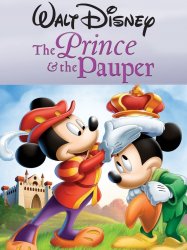
The Prince and the Pauper (1990)
, 24minutesOrigin USA
Genres Comedy, Animation
Themes Films about animals, Mise en scène d'un rongeur, Mise en scène d'une souris, Children's films, Mise en scène d'un mammifère
Actors Wayne Allwine, Bill Farmer, Tony Anselmo, Arthur Burghardt, Charles Adler, Frank Welker
Rating70%





Dans un royaume, autrefois prospère et paisible, le roi tombe gravement malade alors que débute l'hiver, et il doit rester alité...

Who Framed Roger Rabbit (1988)
, 1h44Directed by Hayao Miyazaki, Robert Zemeckis
Origin USA
Genres Comedy, Fantasy, Action, Crime, Animation
Themes Films about animals, Films about films, Mise en scène d'un lapin ou d'un lièvre, Mise en scène d'un rongeur, Mise en scène d'une souris, Buddy films, Children's films, Mise en scène d'un mammifère
Actors Bob Hoskins, Christopher Lloyd, Charles Fleischer, Stubby Kaye, Joanna Cassidy, Lou Hirsch
Rating76%





In 1947, cartoon characters are commonly referred to as "toons" and most work as paid actors in Hollywood. They frequently interact with humans and animals, and dwell in the animated district of Toontown, owned by businessman Marvin Acme. Amongst the toon stars is Roger Rabbit, who does comedy shorts with Baby Herman, but as of late his performances are poor. Meanwhile, R.K. Maroon, Roger’s employer and head of Maroon Studios, hires private detective Eddie Valiant to investigate rumors that Roger’s wife Jessica Rabbit is having an extramarital affair. Eddie himself is an alcoholic, following the murder of his brother Teddy at the hands of a toon. Going to the Ink & Paint Club, Eddie at first believes that Jessica is a rabbit (due to her last name), but surprised when he sees that she's a very attractive woman. He later attempts and manages to snap photographs of Marvin Acme playing patty cake with Jessica, showing them to Maroon and a distraught Roger who vows he and his wife will be happy, before running off.

Mickey's 60th Birthday (1988)
Origin USA
Genres Animation
Actors Wayne Allwine, Carl Reiner, Meredith Baxter, Russi Taylor, Tony Anselmo, Charles Fleischer
Rating69%





Mickey Mouse's 60th Birthday special is being taped and as his appearance in the show draws to a close, Mickey finds himself trying to decide how he should present himself to his audience. Rummaging through an old trunk, he finds the magic hat from The Sorcerer's Apprentice segment of Fantasia and considers using it, but he is warned by the sorcerer who owns the hat (who was not Yen Sid) that he shouldn't be using other people's magic when he has his own, which Mickey initially doesn't understand. With that in mind, Mickey goes out on stage along with his birthday cake, provided by Roger Rabbit, who realizes that he placed a stick of dynamite on the cake instead of a candle. In his attempt to put the dynamite out, Roger ends up destroying the set, which prompts Mickey to use the magic from the hat to repair the damage. The audience screams for more and Mickey agrees to do so, but when he does, he suddenly vanishes.

Donald in Mathmagic Land (1959)
, 27minutesDirected by Wolfgang Reitherman, Hamilton Luske, Les Clark, Joshua Meador
Origin USA
Genres Comedy, Fantasy, Animation
Themes Films about animals, Films about mathematics, Films about birds, Mise en scène d'un canard, Children's films
Actors Clarence Nash, Paul Frees
Rating77%





Donald Duck explique, grâce à plusieurs aventures dans le monde de l'animation, l'avantage des mathématiques dans le quotidien ainsi que quelques applications pratiques des mathématiques.
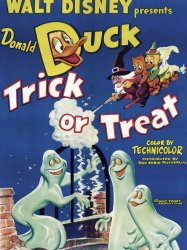
Trick or Treat (1952)
, 6minutesDirected by Jack Hannah
Origin USA
Genres Comedy, Fantasy, Musical, Animation
Themes Films about animals, Films about magic and magicians, Films about birds, Witches in film, Mise en scène d'un canard, Children's films
Actors Clarence Nash, Ken Darby, June Foray, Thurl Ravenscroft
Rating71%





The film opens with the song "Trick or Treat for Halloween", the lyrics of which tell the film's moral – one must be generous on Halloween or face trouble.

One Hour in Wonderland (1950)
Directed by Richard Wallace, Robert Florey
Origin USA
Genres Comedy, Musical, Animation
Themes Children's films
Actors Walt Disney, Kathryn Beaumont, Bobby Driscoll, Edgar Bergen, Hans Conried, Adriana Caselotti
Rating69%





Edgar Bergen informs Charlie McCarthy and Mortimer Snerd that Walt Disney has invited them to a tea party. Charlie is hesitant to go, but reluctantly changes his mind when he learns Kathryn Beaumont will be there. While driving to the studio, Edgar tells the story of Alice in Wonderland, much to Charlie's dismay. When they arrive, Walt Disney tells everyone that he was able to buy the Magic Mirror from Snow White (who apparently got it from the Wicked Queen). Charlie insults the mirror, calling it a "hopped-up television set." This enrages the mirror but Walt calms him down. The Mirror then shows everybody what they wish to see. He shows Kathryn a scene from Snow White and the Seven Dwarfs, Charlie the Mickey Mouse short Clock Cleaners (although Charlie wanted to see himself), Bobby Driscoll a Br'er Rabbit story, Mortimer a Pluto short, and Edgar a performance by Firehouse Five Plus Two. At the end of the song, they see Walt, and frantically finish a scene with Tweedledee and Tweedledum. The Mirror at first refuses to show the unfinished Alice in Wonderland, but changes his mind when everyone wants to see it. The Mirror then reluctantly shows a scene from Alice in Wonderland. At the end of the special, Edgar has acquired the Magic Mirror. Charlie tries to make a deal with the mirror, but it turns out Mortimer is the new slave of the magic mirror. Charlie changes his mind and goes to sleep.

Drip Dippy Donald (1948)
, 7minutesDirected by Jack King
Origin USA
Genres Comedy, Animation
Themes Films about animals, Films about birds, Mise en scène d'un canard, Children's films
Actors Clarence Nash
Rating71%





Après une grosse journée, Donald voudrait bien dormir. Malheureusement, son sommeil est perturbé par son robinet qui fuit et Donald fera tout pour empêcher celui-ci de faire du bruit.

Fun and Fancy Free (1947)
, 29minutesDirected by Hamilton Luske, William Morgan, Jack Kinney, Bill Roberts
Origin USA
Genres Musical, Animation
Themes Films about animals, Films about dogs, Films about birds, Mise en scène d'un rongeur, Musical films, Mise en scène d'une souris, Children's films, Mise en scène d'un mammifère, Mise en scène d'une plante
Actors Cliff Edwards, Edgar Bergen, Luana Patten, Walt Disney, Clarence Nash, Jimmy MacDonald
Rating74%





La harpe chantante possède le don d'offrir la joie, la beauté et le bonheur autour d'elle, protégeant la Vallée enchantée. Par un beau matin de printemps, d'une fenêtre du château, la harpe entame une chanson et entraîne les moutons, une vache et un taureau, des corbeaux dans une farandole de joie. Mais une sombre nuit, elle est enlevée par un inconnu. La vallée n'étant plus protégée par un charme, elle périclite. Trois fermiers de la vallée, Mickey, Donald et Dingo, tentent de survivre en se partageant des tranches de pain transparentes et un unique haricot. Mais Donald n'en peut plus : il envisage de tuer la vache à coup de hache tellement la faim le rend fou.
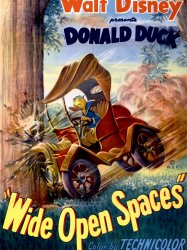
Wide Open Spaces (1947)
, 7minutesDirected by Jack King
Origin USA
Genres Comedy, Animation
Themes Films about animals, Films about birds, Mise en scène d'un canard, Children's films
Actors Clarence Nash, Billy Bletcher
Rating68%





Épuisé par le chemin qu'il vient de parcourir en voiture, Donald arrive en pleine nuit dans un motel mais le tarif exigé pour le service minimum est si exorbitant qu'il part installer sa tente en pleine forêt...
 Connection
Connection

